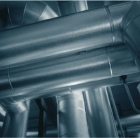B&ES updates ductwork guides

The Building & Engineering Services Association (B&ES) has updated two of its ductwork guides. One is DW/144 ‘Specification for sheet metal ductwork’, a comprehensive reference guide recognised as the standard specification for ductwork manufacture and testing. The other is DW/143 ‘Guide to good practice — ductwork air leakage testing’, a concise practical guide to leakage testing and ductwork classification.
DW/144 was first published in 1963, and this second edition has been aligned to all current BS, EN, ISO and other standards and regulations. Far-reaching revisions in the new 200-page edition take account of developments in technology and working practices.
Peter Rogers, chairman of the B&ES ductwork group technical committee, explains, ‘A key element in reviewing DW/144 was to ensure that the specification continues to offer realistic benchmarks.’
DW/143 has also been brought fully up to date, with clear explanations of the classes of ductwork that must be tested under regulations, acknowledging the re-introduction of high-pressure Class D ductwork to conform to European practice. Leakage testing of high-pressure ductwork is mandatory in DW/144; testing of ductwork designed to operate at low and medium pressures is required only when stipulated in individual job specifications.
In his foreword to DW/143, Peter Rogers observes: ‘Ductwork contractors faced with a job calling for leakage testing should take this requirement very seriously and satisfy themselves as the job progresses that the required leakage rates are within the limits set by the system designer or the client. The cost of making good an installation that has been found on completion to have failed in this respect can be very expensive.’







